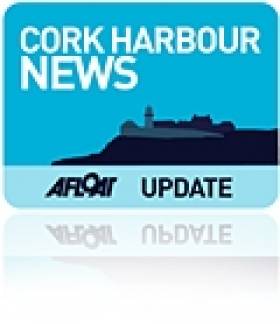Displaying items by tag: sea scout
Sea Scout Master Mariner Awards Go to Howth and Malahide
The 2024 Sea Scout Master Mariner competition took place in Dublin on 10 March. This maritime skills event has been running since 1995 and is supported by the Irish Institute of Master Mariners. This year’s event had a focus on communications and coastal ecosystems, as well as testing core navigation and boat handling skills.
The Captain Desmond Fortune “Founders Award” for the highest placing Venture Scout was won by Conor Brosnan from 7th Port (Howth) Sea Scouts.
The Captain Cian Timmons memorial trophy for the highest placing Rover Scout was won by Cormac Eason from 9th Port (Malahide) Sea Scouts. The event included a practical boat handling exercise in Malahide Marina, with Dan Clohessy from 9th Port (Malahide) achieving the highest marks in this section, receiving the Eoghan Lavelle Cox’n prize.
 The Sea Scouts maritime skills event was held at Malahide in County Dublin
The Sea Scouts maritime skills event was held at Malahide in County Dublin
As part of the event Éanna Gallagher, a former Sea Scout, from the Local Authority Waters Programme conducted a workshop on clean water issues and on how Scouting can contribute to community water initiatives.
The 30th-anniversary edition will take place in Galway in March 2025.
52nd Sea Scout Sailing Regatta Takes Place at Malahide
The 52nd annual Sea Scout sailing regatta took place in testing conditions on Malahide’s inner estuary on 15th October.
Malahide Yacht Club provided the race committee with a warm welcome to its Broadmeadows facility for the day of team racing and seamanship challenges.
Gusty westerly winds made for challenging sailing for Sea Scouts from around Ireland.
While there have been strong showings from Howth and Galway Sea Scouts in recent years, this year it was Malahide Sea Scouts Lir Troop which dominated proceedings.
It won the team racing competition, the seamanship trophy, the Albatross individual trophy (named after the Sea Scouts former training centre on the LS Albatross lightship) and the Centenary Cup for the best scoring boat of the day.
Sea Scout Conference In Cork Harbour Attended by 90% of Groups
#seascouts – The 2015 Sea Scouting conference was held last weekend based in the Commodore Hotel in Cobh. Over 90% of the country's Sea Scout groups were in attendance, with delegates from as far away as Donegal, Louth and Galway. Sea Scouting is a branch of Scouting Ireland which concentrates on the development of leadership skills through adventurous activities afloat, having being founded by Baden Powell's brother in the 1910s. Its members make up about 1 in 12 of Scouting Ireland's members.
The weekend's programme was packed with workshops and speakers, with Commodore Hugh Tully, Flag Officer Commanding the Naval Service opening the conference. Lieutenant Commander Martin Brett of the Naval Service gave the keynote speech at the dinner on Saturday evening. Lt Cdr Brett, who also the Venture Scout Leader in the 55th Cork (Carrigaline) spoke about leadership at sea and his presentation was a highlight of the weekend. Workshops included a presentation by Scouting Ireland's new Programme Commissioner for Youth Empowerment Niamh Donnelly, hands-on sessions including an exploration of inclusivity for young people with disabilities led by Ciaran Murphy from the ISA, a session on applying the Leave no Trace principles to activities afloat and talks on adventurous journeys including Finbarr Hedderman who spoke about his swim from Ireland to Scotland.
There was also a presentation from Sail Training Ireland. In conjunction with Sail Training Ireland, Sea Scouting launched an opportunity for all Scouts age 16-26 to join a Scout-only voyage from Falmouth to Belfast as part of the Tall Ships festival this summer.
Chief Scout of Scouting Ireland Michael John Shinnick also attended the gala dinner on the Saturday evening. In recognition of his support over the last 6 years as Chief Scout, he was presented with a framed photo of himself at the helm of Yahtzee, the well-known ISORA campaigner, which acted as committee boat at the 100th anniversary Sea Scout Rowing Regatta last year in Dun Laoghaire.
Programme Commissioner for Sea Scouting Stephen Taylor said about the conference: "We are at very exciting time for Sea Scouting with a number of new Sea Scout Groups opening around the country. We also have some ambitious projects in the pipeline that will see more and more young people enjoying fun and adventure on the water. The level of attendance at the conference and the spirit in which delegates engaged shows a bright future afloat."





























































